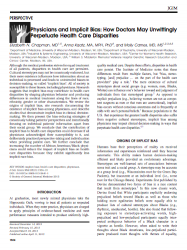
Although the medical profession strives for equal treatment of all patients, disparities in health care are prevalent. Cultural stereotypes may not be consciously endorsed, but their mere existence influences how information about an individual is processed and leads to unintended biases in decision-making, so called "implicit bias". All of society is susceptible to these biases, including physicians. Research suggests that implicit bias may contribute to health care disparities by shaping physician behavior and producing differences in medical treatment along the lines of race, ethnicity, gender or other characteristics. We review the origins of implicit bias, cite research documenting the existence of implicit bias among physicians, and describe studies that demonstrate implicit bias in clinical decision-making. We then present the bias-reducing strategies of consciously taking patients' perspectives and intentionally focusing on individual patients' information apart from their social group. We conclude that the contribution of implicit bias to health care disparities could decrease if all physicians acknowledged their susceptibility to it, and deliberately practiced perspective-taking and individuation when providing patient care. We further conclude that increasing the number of African American/Black physicians could reduce the impact of implicit bias on health care disparities because they exhibit significantly less implicit race bias.
| Allegato | Dimensione |
|---|---|
| 174.25 KB |

